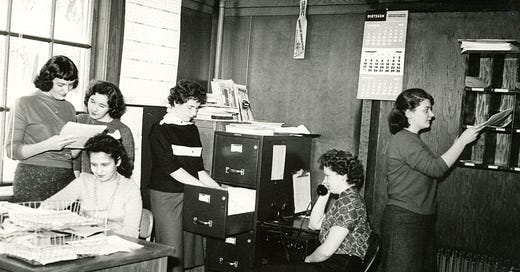FINNS: An Oral History of Finnish-Americans in New Hampshire’s Monadnock Region
Excerpted from FINNS: An Oral History... by Patricia Kangas Ktistes, 1997, all rights reserved.
Cindy Smith
What I saw was that Finnish students at Mascenic were not dramatically different on first glance from the rest of the population. You get used to the sizes of their families and there’s a distinctive look: I think that was more of an adopted style. But really, it was difficult in a lot of ways to distinguish them from the rest of the culture and I don’t know whether that’s new or not. I found that there was either an indifference to or a sense of pride in the culture. I met very few kids railing against their culture. In churches that most of the actively church-going kids attend, there’s an intensity. The ones who were really adhering to their religion were comfortable about it. They were open about it and even though it was not a school where it was easy to be like that, the ones who had it together were pretty proud of where they were with their faith. And I think a lot of that comes from having support in numbers. During the two years that I was there, people would ask me what was happening and my first response would always be, “Well, it’s not the Finnish kids I’m having the problems with.” Because the first assumption from the outside is that the Finns are difficult: that there’s a lack of support for education and that somehow that’s a problem. That’s how people I’ve run into have perceived it. I found the Finnish kids were no more or less motivated than any others. The population there is such that there are parents who support education and parents who don’t. Some of the fiercest parents in defense of education and supporting their kids through school were Finnish and I found that the sense of family is very strong. I think family is a hallmark for Finnish kids in Mascenic particularly. There are a lot of brothers and sisters, cousins: they have a strong sense of who they are and how they connect and I’ve seen that work as a strength. Certainly with the religion, that plays a part. There’s a focus, an intensity that shuts out other world views. There’s no New Age allowed. There’s a way to go about things and for the observant Finns that is specific. And frankly, with the condition things are in these days, I don’t think there’s too much wrong with that. I think it’s high time in many respects. And the kids who are going to follow through with that are going to do really well.
In terms of prejudice or lack of understanding, I didn’t see any more of that in Finns than I did in the other kids. If anything, the Finnish kids I encountered—and I know it’s not all—are pretty sensitive prejudice and discrimination because I think oftentimes they felt that they were being
discriminated against by peers if not faculty. Once I was giving a student a ride home after a play rehearsal. While in the car, we saw a young boy, a Finn, riding down a long hill on a bicycle, very fast, and without a helmet. I commented on his lack of a helmet and my student replied, “Well, Mrs. Smith, if you had 15 kids, you’d send some of them out to ride without helmets, too.”




I agree with Cindy's interpretation of the atmosphere at Mascenic. Actually it was difficult in the 60s to know who was really Finnish. I can name many families where the mothers were French and the kids' last name was Finnish. There were also kids with Finnish mothers and last names that were French or some other nationality. I don't blame the school for my brother's misfortune. It's a choice he made. There is such a thing as individual responsibility, although it seems less so today. Today a lot of people blame someone else, or some event in the past, for their misfortune. I knew my brother's biology teacher and she was very good.